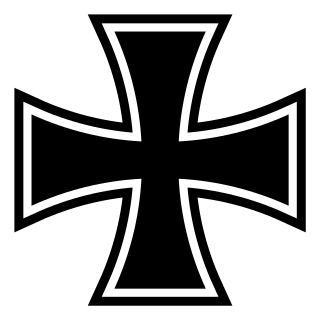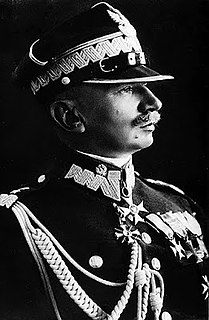See also
| | This disambiguation page lists articles associated with the title Gold Cross. If an internal link led you here, you may wish to change the link to point directly to the intended article. |
Gold Cross or Golden Cross may refer to:
| | This disambiguation page lists articles associated with the title Gold Cross. If an internal link led you here, you may wish to change the link to point directly to the intended article. |

The Iron Cross is a former military decoration in the Kingdom of Prussia, and later in the German Empire (1871–1918) and Nazi Germany (1933–1945). King Frederick William III of Prussia established it on 17 March 1813 during the Napoleonic Wars. The award was backdated to the birthday of his late wife, Queen Louise. Louise was the first person to receive this decoration (posthumously). The recommissioned Iron Cross was also awarded during the Franco-Prussian War, World War I, and World War II. The Iron Cross awarded during World War II has a swastika in the center. The Iron Cross was usually a military decoration only, though there were instances awarded to civilians for performing military functions. Two such examples were Hanna Reitsch, who received the Iron Cross 2nd Class and Iron Cross 1st Class, and Melitta Schenk Gräfin von Stauffenberg, who received the Iron Cross, 2nd Class. Both were civilian test pilots during World War II.

Generał Tadeusz Komorowski, better known by the name Bór-Komorowski was a Polish military leader. He was appointed commander in chief a day before the capitulation of the Warsaw uprising and following World War II, 32nd Prime Minister of Poland, 3rd Polish government-in-exile in London.

Stefan Paweł Rowecki was a Polish general, journalist and the leader of the Armia Krajowa. He was murdered by the Gestapo in prison on the personal order of Heinrich Himmler.

Władysław Albert Anders was a general in the Polish Army and later in life a politician and prominent member of the Polish government-in-exile in London.

Leopold Maximilian Joseph Maria Arnulf, Prinz von Bayern was born in Munich, the son of Prince Regent Luitpold of Bavaria (1821–1912) and his wife Archduchess Augusta of Austria (1825–1864). He was a Field Marshal (Generalfeldmarschall) who commanded German and Austro-Hungarian forces on the Eastern Front in World War I.

Archduke Friedrich, Duke of Teschen was a member of the House of Habsburg and the Supreme Commander of the Austro-Hungarian Army during World War I.

The War Order of the German Cross, normally abbreviated to the German Cross or Deutsches Kreuz, was instituted by Adolf Hitler on 28 September 1941. It was awarded in two divisions: in gold for repeated acts of bravery or military leadership; and in silver for distinguished non-combat war service. The German Cross in Gold ranked higher than the Iron Cross First Class but below the Knight's Cross of the Iron Cross, while the German Cross in Silver ranked higher than the War Merit Cross First Class with Swords but below the Knight's Cross of the War Merit Cross with Swords.

The War Merit Cross was a state decoration of Germany during World War II. By the end of the conflict it was issued in four degrees and had an equivalent civil award. A "de-Nazified" version of the War Merit Cross was reissued in 1957 by the Bundeswehr for its veterans.

Bolesław Bronisław Duch (1885–1980) was a Polish Major General and General Inspector of the Armed Forces.
Authorized foreign decorations of the United States military are those military decorations which have been approved for wear by members of the United States armed forces but whose awarding authority is the government of a country other than the United States.

The Spanish Cross was an award of Nazi Germany given to German troops who participated in the Spanish Civil War, fighting for nationalist general, later Spanish caudillo, Francisco Franco.

Juliusz Karol Wilhelm Józef Rómmel was a Polish military commander, a general of the Polish Army.

The Knight's Cross of the Iron Cross, or simply the Knight's Cross, and its variants, were the highest awards in the military and paramilitary forces of Nazi Germany during World War II.

The Order of Merit of the German Eagle was an award of the German Nazi regime, predominantly to foreign diplomats. The Order was instituted on 1 May 1937 by Adolf Hitler. It ceased to be awarded following the collapse of Nazi Germany at the end of World War II in Europe. The wearing of the Order of Merit of the German Eagle is prohibited in the Federal Republic of Germany.

The House Order of Hohenzollern was a dynastic order of knighthood of the House of Hohenzollern awarded to military commissioned officers and civilians of comparable status. Associated with the various versions of the order were crosses and medals which could be awarded to lower-ranking soldiers and civilians.

Franz Ritter von Epp, born Franz Epp, from 1918 Ritter von Epp, was a German general and politician who started his military career in the Bavarian Army. Successful wartime military service earned him a knighthood in 1916. After the end of World War I and the dissolution of the German Empire, von Epp was a commanding officer in the Freikorps and the Reichswehr. He was a member of Bavarian People's Party, before joining the Nazi Party in 1928, when he was elected as a member of the German parliament or Reichstag, a position he held until the fall of Nazi Germany. He was the Reichskommissar, later Reichsstatthalter, for Bavaria, and a Reichsleiter of the Nazi Party.

The Military Merit Medal was a military decoration of the Empire of Austria-Hungary. It was founded by Emperor Franz Joseph I on March 12, 1890. The Military Merit Medal is often referred to as the "Signum Laudis" after the inscription on the reverse of the medal.
Orders, decorations, and medals of the German Empire covers those decorations awarded by the states which came together under Prussian leadership to form the German Empire in 1871. For convenience's sake, this category also covers the decorations of the various German states which were no longer in existence in 1871, mainly because they had been annexed by Prussia during the Wars of Unification or before.

The House and Merit Order of Duke Peter Frederick Louis or proper German Oldenburg House and Merit Order of Duke Peter Frederick Louis was a civil and military order of the Grand Duchy of Oldenburg, a member state of the German Empire. The order was founded by Grand Duke Augustus of Oldenburg on November 27, 1838, to honor his father, Peter Frederick Louis of Oldenburg. It became obsolete in 1918 after the abdication of the last grand duke.

The Awards and decorations of the German Armed Forces are decorations awarded by the German Bundeswehr, the German government, and other organizations to the German military and allied forces. Modern era German military awards have been presented since the establishment of the Federal Republic of Germany in 1949.